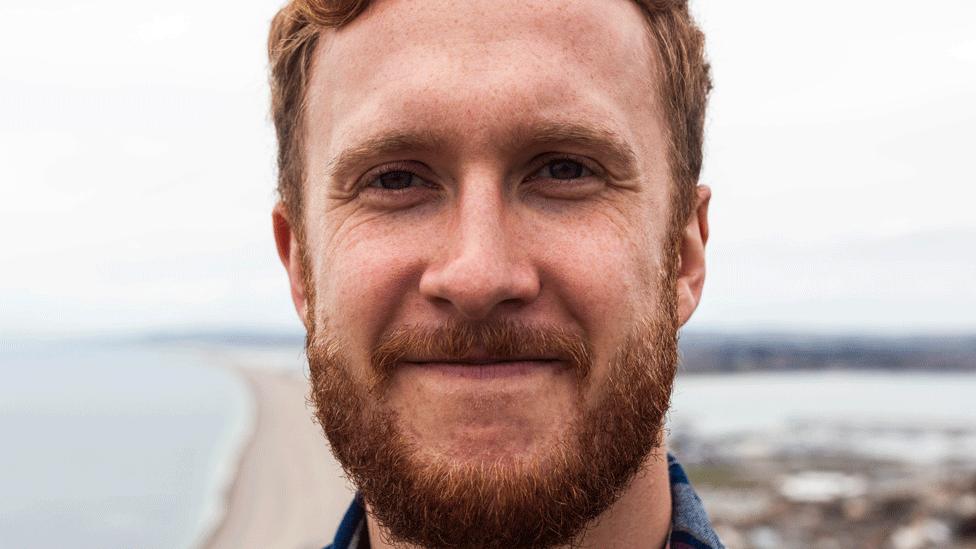Mental health: Mum wants apology for killer son and victim
- Published
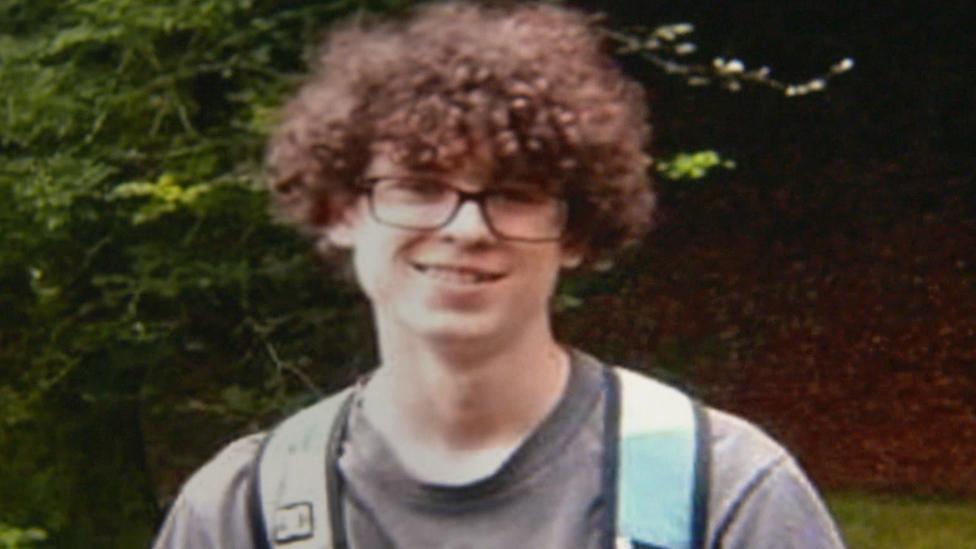
David Fleet stabbed a man to death just 10 days after leaving a psychiatric unit
When Sharon Lees' son David left a psychiatric unit, she said she warned staff he was too unwell to come home.
Ten days later, he stabbed a man to death who was out walking his dog because of "the voices in his head".
Sharon is demanding a public apology from Hywel Dda health board for both her son and the family of the man he killed, Lewis Stone, saying it "could [and] should have been prevented".
Hywel Dda said confidential information prevented it publishing its report.
Sharon raised her son David Fleet in the seaside town of Borth, Ceredigion.
"David loved being on the beach," she said.
"Growing up in Borth was really good for him. He was very quiet, would easily get lost in the crowd."
Growing up, "tiny little obsessions" made her suspect he was autistic.
He was diagnosed at 15, but as he turned 17, other things began to worry Sharon.
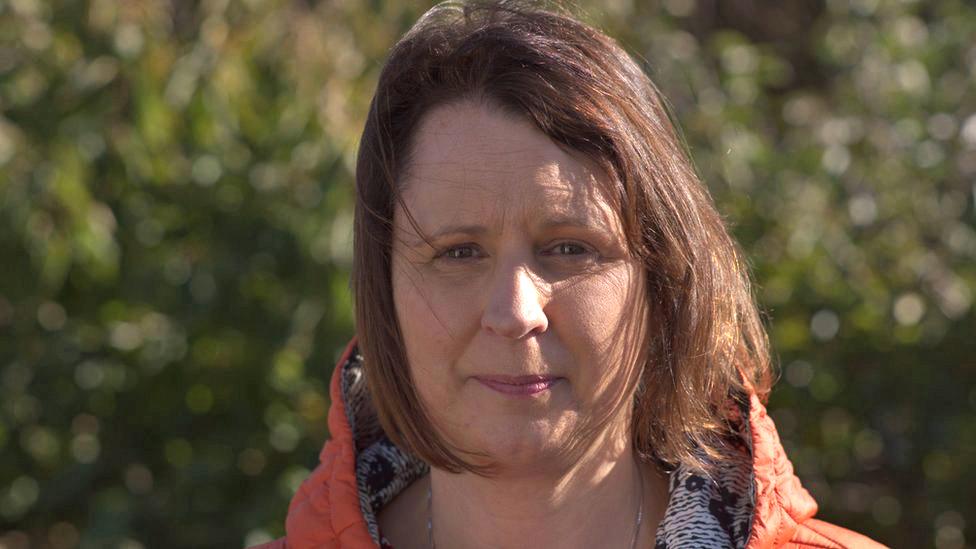
Sharon Lees says her son has feelings of guilt and remorse
"He seemed to think that we'd put something on his head to erase his memory. It was like he was seeing things that weren't there," said Sharon.
He started smoking cannabis to "sort of manage those symptoms", said Sharon, adding he struggled to sleep.
One day she walked into his bedroom to find "quite a lot of blood everywhere... he'd severely self-harmed".
She rushed her son to A&E and he was treated with anti-psychotic medication.
When he was well enough, he moved away from home to complete a college course, but he later relapsed and had to return home.
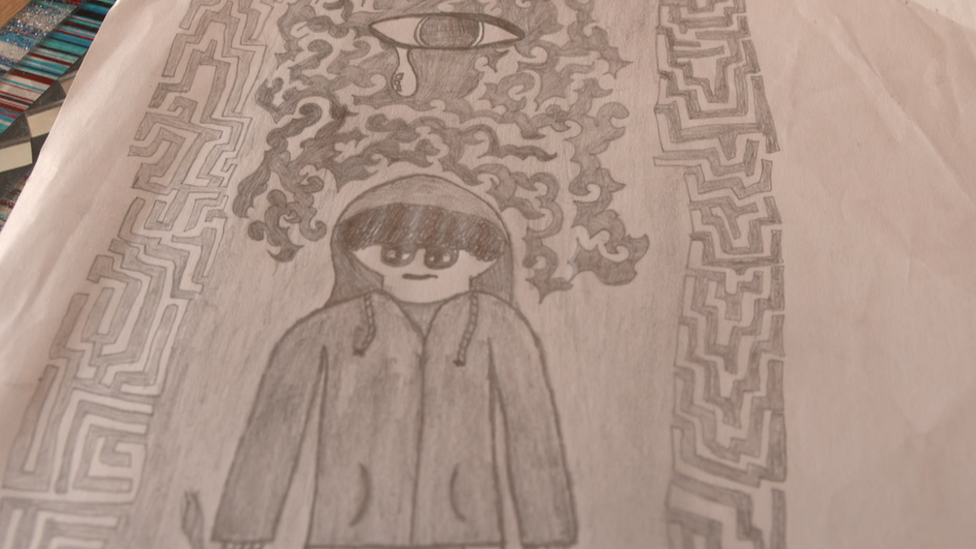
Sharon says David's art gives an insight into the acute mental health issues and paranoia he was experiencing
"It was clear that he was in psychosis. He started asking bizarre questions about someone watching us," said Sharon.
Fleet also began taking knives to bed with him and trying to light small fires in his bedroom.
"Eventually he said to me that he thought he might have to kill someone because 'people are watching us, there was hidden cameras everywhere and nowhere is safe' - that was when I said he had to come with me to hospital," said Sharon.
"We had to prise the knife off him to get him into the car and get him into hospital."
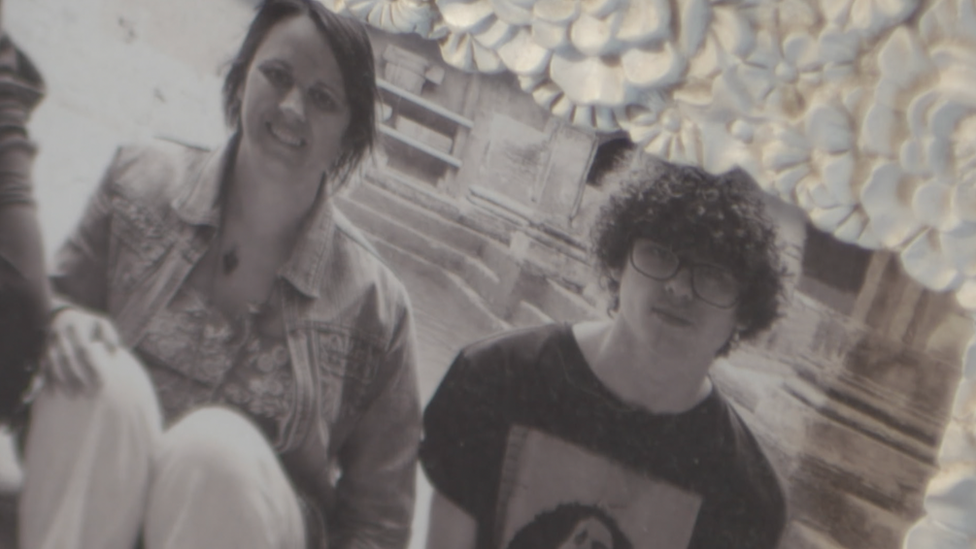
Sharon Lees wants the health board to say sorry to her, her son and Lewis Stone's family
In October 2018, Fleet was detained under the Mental Health Act, external, but when he was allowed home for visits, Sharon said she warned hospital staff he was still buying cannabis and looking for knives.
After four months as an in-patient, staff decided he should be treated at home.
"I just cried because I just don't know how I'm going to cope... he's over 6ft tall, I can't stop him from going out," said Sharon.
Early on 28 February 2019, 10 days after being sent home, Fleet left the house with a knife.
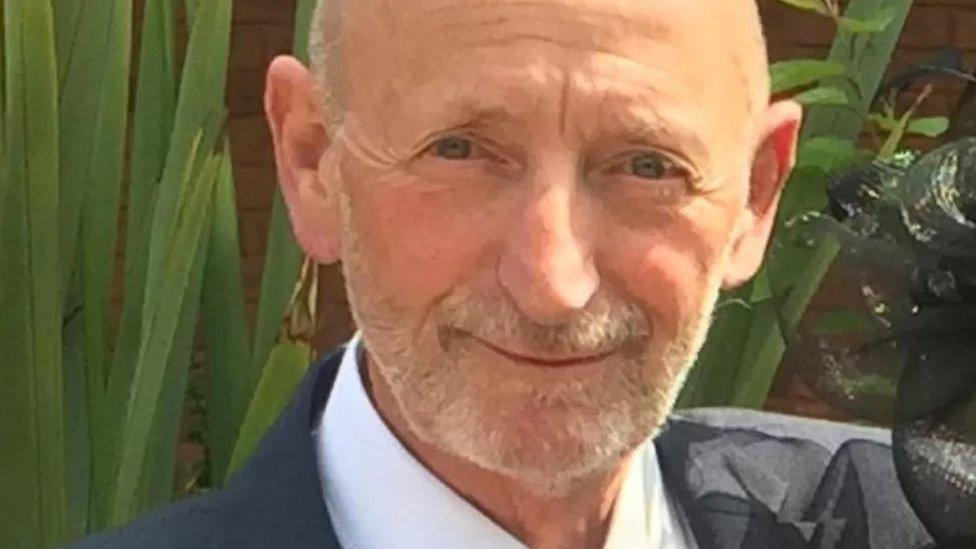
Lewis Stone's family say David Fleet "took away their beloved hero"
"I'm trying to phone him, trying to message him... I looked out of the back window and I could see the air ambulance. I just remember having this really sinking feeling. Like I knew," she said.
Fleet had never met his victim before that day.
Mr Stone, from Staffordshire, was walking his dog Jock along the bank of the River Leri while visiting his nearby holiday home which he and his wife had plans to retire to.
Fleet later told psychiatrists if he had not stabbed Mr Stone, the voices in his head "were going to kill him".
Family of Mr Stone - who died in hospital three months after the attack - said their lives changed in the "most horrific, heart-breaking" way.
They said the "old-fashioned gentleman", who was "adored" by his wife, children and grandchildren, would have been "defenceless".
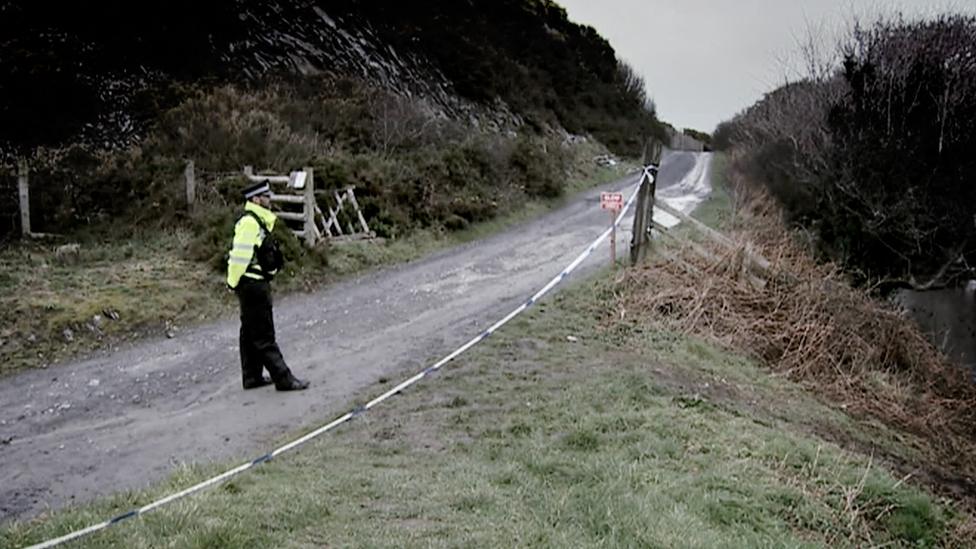
Lewis Stone was stabbed when out walking near Borth Wild Animal Kingdom
BBC Wales Investigates has seen a copy of an internal health board report into David's care prior to the attack.
It reveals that three weeks before the stabbing, a doctor had warned he was not ready to leave hospital because of his "worsening mental state" and the risks he posed with knives.
Just days later, he was sent home without anyone updating his risk assessment and staff were meant to contact him the day before the attack, but did not because of their workload.
He also did not receive a dose of his anti-psychotic medication.
David pleaded guilty to Mr Stone's manslaughter due to diminished responsibility and was detained indefinitely at a secure psychiatric unit on 16 September 2019.
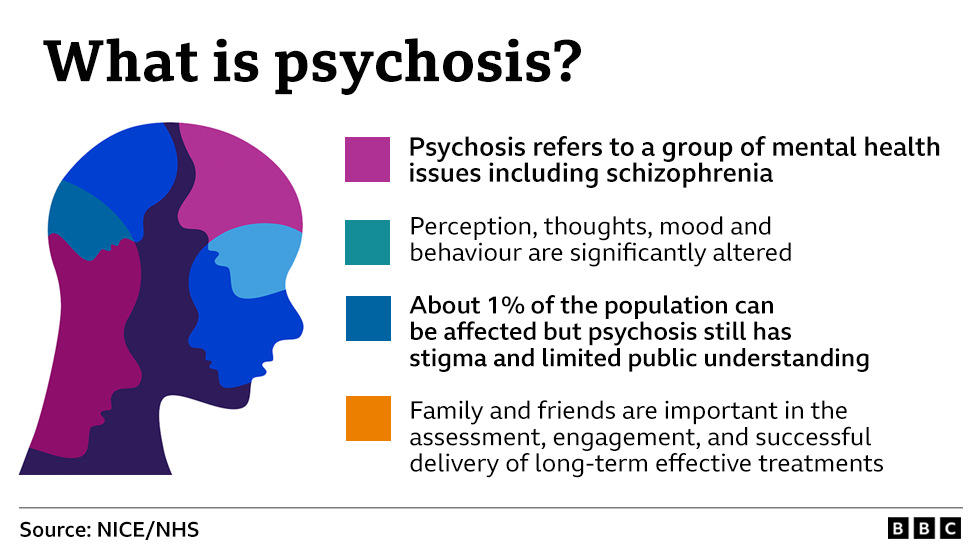
Mr Stone's family said there was "no excuse or forgiveness" for David and "nothing could be said or done to help them understand or move on from what's happened".
They agreed there were "huge failings in the mental health sector" to have "such a monster released and walking the streets, able to cause such harm" and want David Fleet to remain locked up.
How common are mental health homicides?
Studies by the University of Manchester, external suggest between 2010 and 2020 there were 5,876 homicide offenders in the UK, of which 610 (11%) were under the care of mental health services.
While there was a fall in the overall homicide rate in England and Wales since 2008, the percentage of homicides carried out by people with schizophrenia actually increased, external.
Researchers said drug and alcohol misuse were known to elevate risk.
The Welsh government has the power to commission independent mental health homicide reviews and share lessons as widely as possible, but BBC Wales Investigates has discovered that since 2016, it has stopped asking for them.
This mean lessons from this and three other killings involving mentally ill people in Wales in that time have not been shared.
Lord Alex Carlile, a former MP and a barrister with decades of experience in homicide cases is critical of the "failure" to share information in David's case.
"It is absolutely dreadful. It is essential that in cases where there is a major safeguarding issue, information should be shared by all the relevant public and private sector organisations," he said.
He also said, the Welsh government should have commissioned independent reviews into other mental health homicides in this time, calling it a "seven-year scandal".
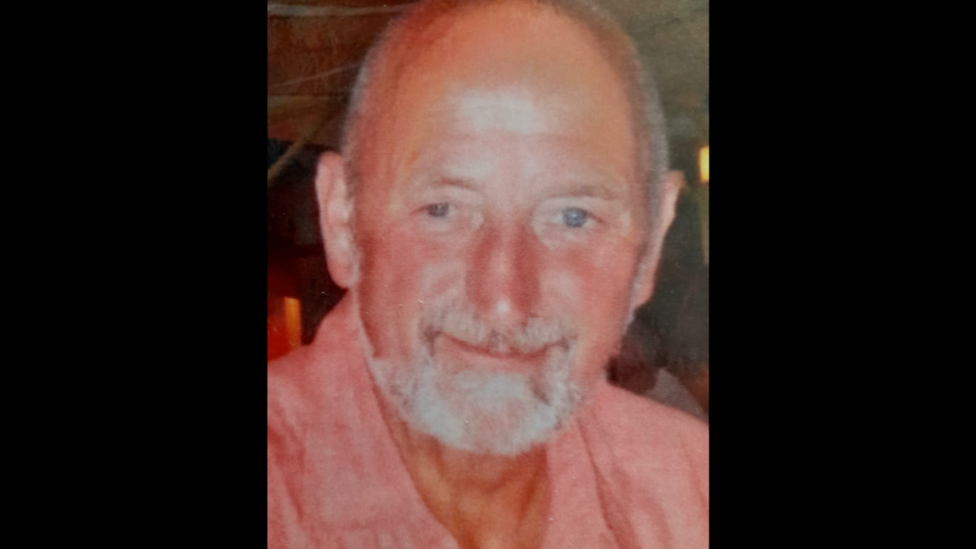
Lewis Stone died three months after being stabbed while taking his dog for a walk in February 2019
The Welsh government's decision means that, four years on from the killing, Mr Stone's family have not been able to see information about the missed opportunities to monitor Fleet.
Hywel Dda health board said it shared its internal report into Fleet's care with some of its own staff and the Welsh government but could not publish it because it contained confidential medical information.
In a private letter, Sharon was told it had subsequently made changes to its services, but she believes that, had details and lessons been shared with other health boards, it could potentially have prevented other killings.
The Welsh government said it was "satisfied" it had not needed to commission independent mental health homicide reviews since 2016 because health boards had been "thorough" when investigating their own cases.
However, it did admit the wider review system needed to change to ensure better "communication and coordination" so it was introducing the Single Unified Safeguarding Review, external.
A spokesman added: "This new approach eliminates the need for families to take part in multiple, often onerous and traumatising, reviews and will more quickly identify learning, build a greater understanding of what happened during an incident and why, and provide a clear action plan to improve services."
Sharon believes her son was let down by mental health services, leaving two families "devastated" as a result.
"The feelings of guilt and remorse that David is feeling are incomprehensible," she added.
She now wants the health board to say sorry to her son and Mr Stone's family.
"It's really important for just not only us, but for Mr Stone's family to have a public apology because of his illness and the lack of care that he received... it only feels justified that he also receives an apology because the health board failed him, which then in turn failed his victim's family."
BBC Wales Investigates, BBC One Wales on Monday at 20:30 BST. It will also be available on BBC iPlayer
- Published14 July 2021
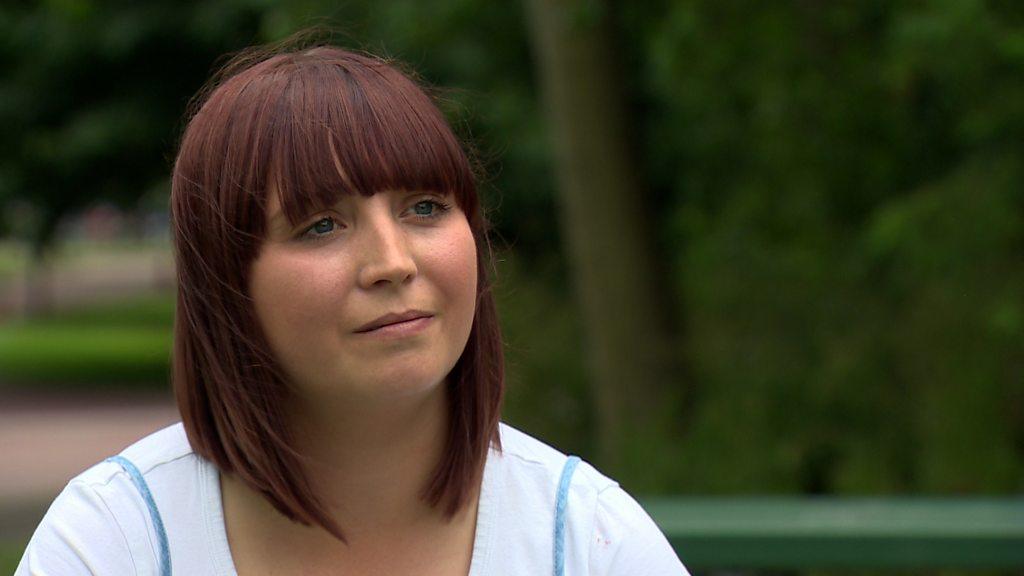
- Published12 October 2022
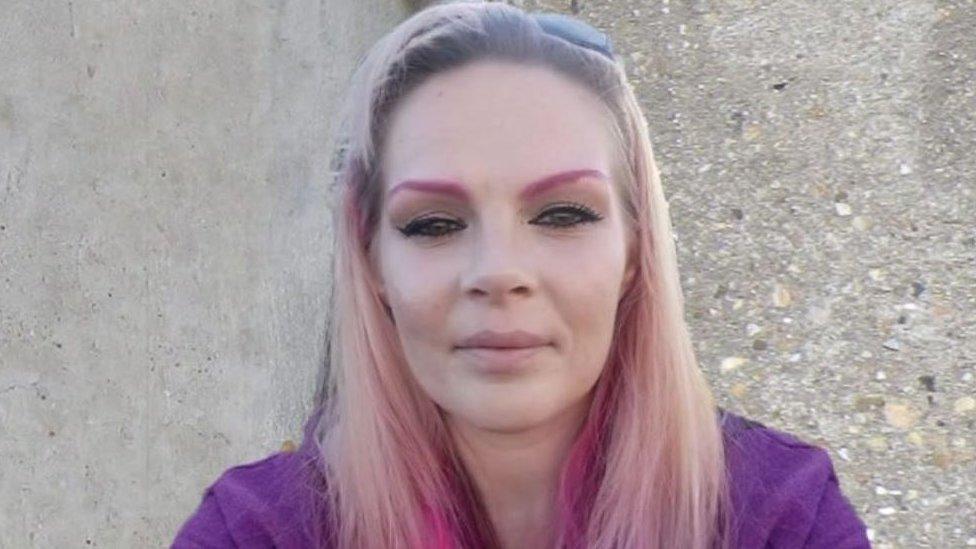
- Published18 September 2018
